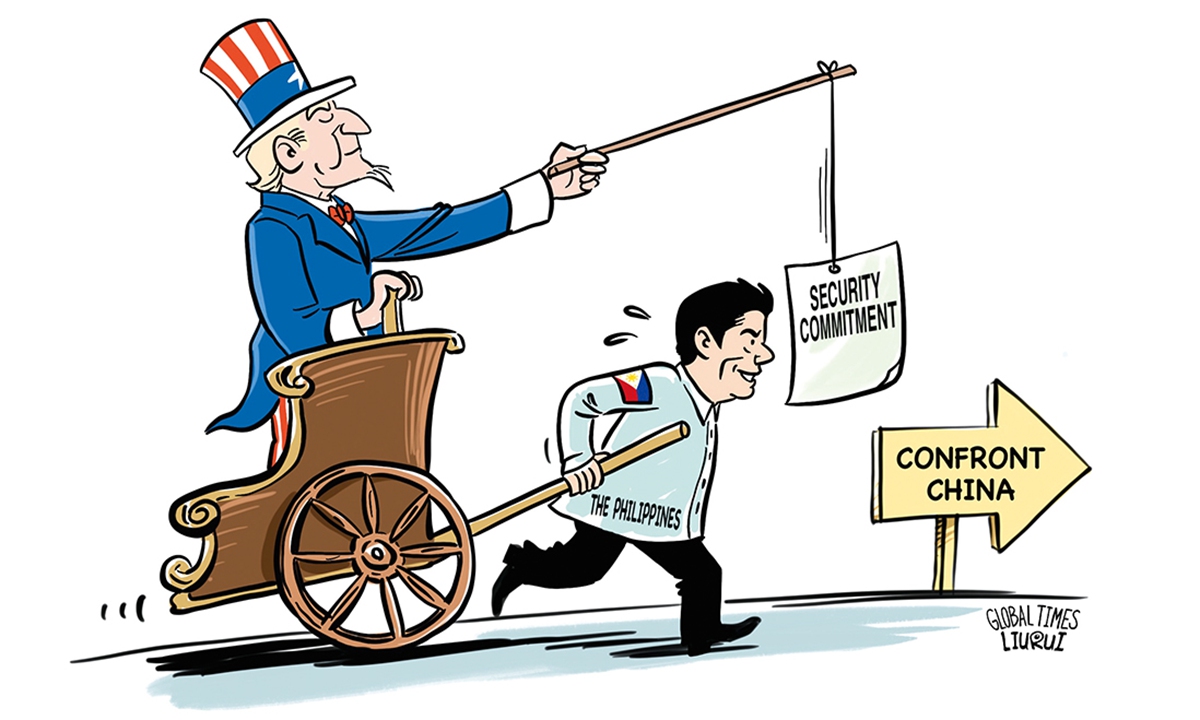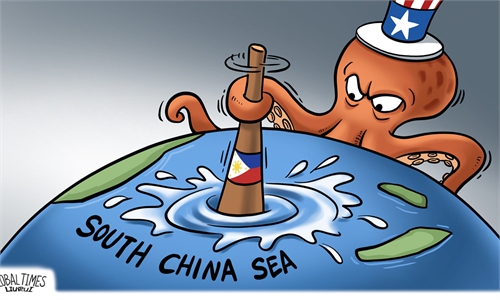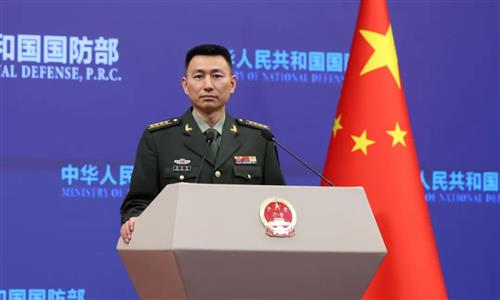
Illustration: Liu Rui/GT
On Tuesday, during his visit to the Philippines, US Secretary of State Antony Blinken said that China's "provocative actions" in the South China Sea violate the Philippines' rights, reaffirming the US security commitment to the Southeast Asian country. Prior to Blinken's visit, Washington also claimed that the top US diplomat's trip would "promote peace and stability in the South China Sea."Since the escalation of the South China Sea situation in 2023, several senior US officials have visited the Philippines. During these visits, they have either criticized Beijing indiscriminately or openly bolstered Manila's confidence. Apart from fanning the flames and escalating tensions in the South China Sea region, the US' actions have made no contribution to peace and stability in the region.
Since gaining independence in 1946, the Philippines has been an important link in the US' military strategic deployment in the Pacific region. The 1951 Mutual Defense Treaty marked the formal establishment of the military alliance between the two countries. Under this treaty, both parties must fulfill alliance obligations to provide military assistance to the other, if they are attacked by a third party. However, considering Manila's limited military capabilities, this two-way military cooperation is more evident with the US stationing troops in the Philippines and providing military aid to it.
During the Cold War, the Philippines was part of US "first island chain" to contain the Soviet Union and China. As a result, the US gained access to a large number of military bases and stationed personnel in the Philippines. Currently, the Philippines is the largest recipient of US military aid in the Asia-Pacific region.
There is no doubt that the military cooperation between the US and the Philippines to some extent meets the needs of the latter country. However, there is no such thing as a free lunch in the world. First, during the Cold War, or at least since the late 1990s, the multiple enhancements of the US-Philippines military relationship, on the surface, served the national interests of the Philippines. However, in the long run, it is actually the Philippines serving the national interests of the US. The Philippines is being used and tied to the track of the US "Indo-Pacific Strategy" to serve its global hegemony. The current policy of the US is to exploit the Philippines and the South China Sea issue to suppress China.
Second, such a relationship has trampled on the dignity of the Philippines, as exemplified by the frequent occurrence of sexual assault scandals of US soldiers in the Philippines. The so-called special relationship between the Philippines and the US has been criticized by many Philippine scholars.
The US is a major destination country for Philippine military personnel studying and receiving training. Annual military exercises, personnel training and other exchanges have provided not only a strong impetus for the two countries' military relations, but also a steady stream of available resources for the US to control the Philippines and erode its strategic autonomy. The Philippine people, basking in the glow of neocolonialism, feel proud and fail to recognize the dangers of this asymmetric relationship.
Today, by exaggerating threats - for example, misinterpreting China's intentions in the South China Sea - the US artificially creates the demand for security for the Philippines. By offering security commitments to Manila, the US has firmly controlled the Philippines, thus making the Southeast Asian country a screw in Washington's "hegemonic aircraft carrier." The US military support has undoubtedly encouraged the Philippines to take bolder and more aggressive actions over the South China Sea issue. Frankly speaking, over the past year or so, Manila's constant challenges to China regarding this issue are unprecedented in the history of bilateral and international relations. Why would the Philippines ignore the huge difference in strength and size when looking across its neighbor?
Will the US get involved in a conflict with China for its partners in East Asia? No one is certain about the answer. But what is certain is that once a conflict breaks out, it is unlikely the Philippines could obtain what does not belong to it.
The author is director of the Center for Philippine Studies at Jinan University. opinion@globaltimes.com.cn


